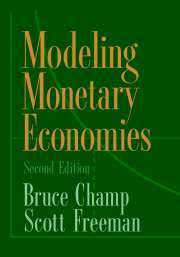Book contents
12 - Bank Risk
from Part II - Banking
Summary
THE BANKS WE have studied so far have been very simple. They face no risk and are always solvent. In contrast, we observe in the world many instances of failures of banks, savings and loans, and other similar financial intermediaries to meet their obligations to depositors. Failure is an unfortunate but integral part of life. Why should the government care more about bank failures than about the much more common business failures of restaurants? Bank failures seem to attract more attention. Banks are seen by many as fragile institutions that depend for their survival on the public trust, a trust that may require support from government guarantees. As the U.S. public has discovered with the recent bailout of savings and loans, these guarantees can be costly to taxpayers, leading the government to regulate the behavior of the financial institutions guaranteed. Ironically, some forms of government regulation may be blamed for the failures they seek to prevent. These questions are addressed in this chapter.
In this chapter, we investigate two possible reasons for bank failures. A bank may fail because the assets it owns or the loans it has made may realize such unexpectedly low returns that the bank no longer has the resources to pay depositors what it owes them. It may also fail if a sudden rush of withdrawals forces it to sell off assets at a loss. We look at the second possibility first.
Demand Deposit Banking
Actual banks are different from the banks we have modeled thus far in an important way.
- Type
- Chapter
- Information
- Modeling Monetary Economies , pp. 214 - 230Publisher: Cambridge University PressPrint publication year: 2001



